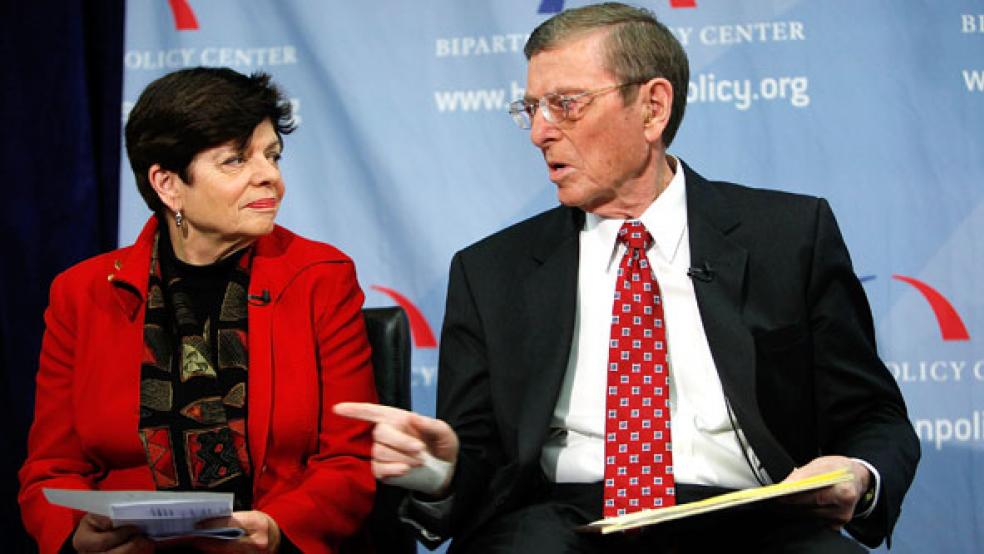Just how powerful is the special “Super Committee” that Congress created to recommend long-term deficit reduction? A task force of prominent budget experts concluded on Wednesday that the 12-member bicameral panel has far more power than many realize, and could work well past a November deadline in pursuit of a “grand bargain” of entitlement and tax reforms.
The deal reached by President Obama and Congress in early August to raise the debt ceiling will impose spending caps on domestic and defense programs to achieve $917 billion in savings over the next 10 years, while giving the new joint committee until Nov. 23 to devise a plan to slash $1.2 trillion to $1.5 trillion more from the deficit over the coming decade. The committee held its first formal meeting this week, and the dozen Democratic and Republican members are under enormous pressure from business leaders, conservative lawmakers, budget groups and the White House to “go big” and devise a far bigger package of as much as $4 trillion of spending cuts, entitlement reforms and tax increases.
A task force assembled by the well-regarded Bipartisan Policy Center said today that Congress granted the super committee “extraordinarily broad power” in the Budget Control Act of 2011 to rapidly assemble a package of budget savings and submit it to Congress for approval before the Nov. 23 deadline. But the Super Committee could also include detailed instructions to the relevant House and Senate committees to draft legislation to rewrite the tax code and alter Medicare, Medicaid and Social Security and report back next year.
Bipartisan Policy Center officials, including former CBO Director Alice Rivlin and former Senate Budget Committee Chairman Pete V. Domenici, R-N.M., told reporters that the Super Committee has unprecedented powers to fashion a major deficit reduction strategy as it sees fit, within a time table it can determine, provided there is the political consensus to move ahead.
“It can do anything it likes,” said Rivlin, co-chairman with Domenici of the center’s Debt Reduction Task Force. “It can say Christmas is in August. . . The committee has the right to go the rest of the way and do something bigger than the mandate.”
Power to Dictate Targets to Be Achieved
For example, if it seeks a “grand bargain,” the Super Committee could specify to House and Senate committees with jurisdiction over tax and entitlement policy the deficit reduction targets to be achieved and the nature of the structural program changes to be made, the task force said.
Whatever the House and Senate committees come up with would then be combined into one major bill, analyzed by the Congressional Budget Office to determine its long term impact on the deficit, and then granted “fast-track” action by the House and Senate, without the possibility of a filibuster. As added leverage, the Super Committee could order automatic cuts in those programs in the event the congressional committees fail to report back recommendations for reducing entitlement costs and overhauling the tax code.
Joseph Minarik, Senior vice president and Director of Research for the Committee for Economic Development and a member of the task force, said, “The message of this is there is no excuse” for the Super Committee not to go for a larger deficit reduction and tax and entitlement reform package, if there is the political will.
While there seemed to be a momentary glimmer of hope that Republicans and Democrats might be able to find common ground after returning from an August recess, committee members began squabbling over defense spending, taxes and entitlements almost as soon as they began to meet. And on Tuesday, during testimony by Douglas W. Elmendorf, the director of the CBO, Republican and Democratic members tailored their questions to try to justify their parties’s positions on spending, taxes and the deficit.“Isn’t it fair to say that, in fact, there is an aspect about our budget today that is starkly different, which is the level of revenues?” said Sen. John F. Kerry (D-Mass.). He was trying to make the point that tax revenues as a percentage of the overall economy have been allowed to steadily sink, in taking a crack at the Republicans.
“Isn’t there a danger that the magnitude of the debt is already impeding economic growth?” Sen. Patrick Toomey (R-Pa.) asked Elmendorf, in a thinly veiled criticism of Democratic spending policies.
Moreover, GOP members of the Super Committee were clearly irked by President Obama’s request to include his $447 billion jobs creation program – and tax increases to pay for it – in their discussions, with some fretting that there won’t be enough time before their Nov. 23 deadline to reach consensus on an adequate deficit reduction plan.
Meanwhile, a group of conservative Blue Dog House Democrats urged the Super Committee today to “go big” in seeking a long-term deficit package of as much as $4 trillion and stabilizing the debt as a share of the economy. “Congress and the Joint Committee on Deficit Reduction have a rare opportunity to put our fiscal house in order at a time when the public is paying close attention to our deficits and debt,” the group said in a letter to the Super Committee. “Leaders of both parties will urge you to retreat to the stale party positions and talking points. Political operatives, with an eye toward November 2012, will turn this into a battle of Democrats versus Republicans. Now is the time to take a time-out from the 2012 elections, put party affiliations aside, and work together for the sake of our country’s future.”





